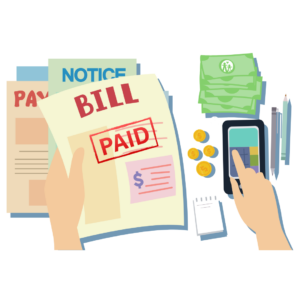10 Practical Steps to Successfully Pay Off Debt and Achieve Financial Freedom
 Living with debt can be a source of stress and financial strain. However, with determination and a well-thought-out plan, you can pay off debt and regain control of your financial future. Here are ten practical steps to help you pay off debt and achieve financial freedom.
Living with debt can be a source of stress and financial strain. However, with determination and a well-thought-out plan, you can pay off debt and regain control of your financial future. Here are ten practical steps to help you pay off debt and achieve financial freedom.
-
- Create a Detailed Budget: Start by evaluating your current financial situation. Make a list of all your income sources and monthly expenses, distinguishing between fixed and variable costs. Writing everything down will give you a clear picture of where your money is going and help you identify areas where you can cut back.
- List and Prioritize Debts: Make a comprehensive list of everything you owe money for, such as credit cards, loans, and any other amounts you still need to pay. Organize the list based on interest rates, with the highest interest debts at the top. Prioritizing higher-interest debts will save you money in the long run.
- Build an Emergency Fund: Establish a small emergency fund before aggressively paying off debt. Having a financial cushion reduces your reliance on credit to pay for unexpected expenses, such as car repairs or medical bills.
- Negotiate Interest Rates: Communicate with your creditors to discuss the possibility of reducing your interest rates. Many of them might be willing to figure out a plan to make it easier for you to pay them back. Lower interest rates allow more of your payments to go towards actually reducing the amount you owe, which is a good thing when you’re trying to pay off debt.
- Explore Debt Consolidation: If you have multiple high-interest debts, consider consolidating them into a single loan with a lower interest rate. Consolidation can simplify your finances with a single payment and potentially reduce the overall interest you’ll pay.
- Implement the Debt Snowball Method: With the debt snowball method, you start by paying off your smallest debts first, regardless of the interest rate. Once you finish paying off the smallest balance, take the money you were using for that debt and use it to pay off the next smallest one. This way, you feel good about quick victories and stay motivated to keep going.
- Cut Unnecessary Expenses: Examine your budget and find ways to cut out non-essential expenses. This might involve reducing dining out, canceling subscription services, or finding cost-effective alternatives for everyday items. Redirect the money saved towards debt repayment.
- Increase Your Income: Look for ways to increase your income, such as adding a part-time job, freelancing, or selling unused items. Supplementing your income can accelerate your debt repayment plan.
- Stay Disciplined and Consistent: Consistency is key when paying off debt. Stick to your budget, make timely payments, and resist the temptation to accumulate more debt. Enjoy the little successes as you go to keep yourself feeling motivated.
- Seek Professional Guidance: If you find it challenging to manage your debt on your own, consider seeking advice from financial professionals or credit counseling services. They can provide personalized guidance and support to help you make informed financial decisions.
Paying off debt requires dedication, discipline, and a strategic approach. By following these ten practical steps, you can take control of your financial situation, reduce or eliminate your debt, and pave the way to a more secure and prosperous future. Keep in mind that each small step adds up and helps you achieve financial freedom over time.